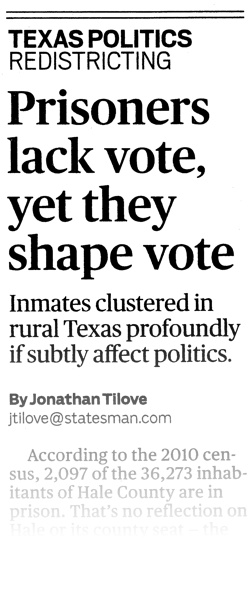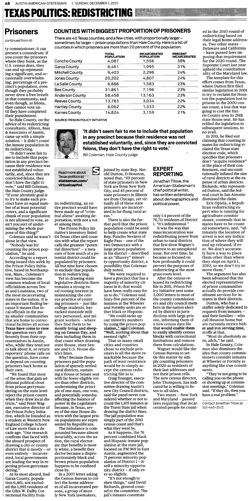Texas counties favor fairness and common sense over prison gerrymandering
Austin American Statesman article by Jonathan Tilove highlights rural Texas counties taking a stand against prison gerrymandering.
by Aleks Kajstura, December 9, 2013
In a recent article, Prisoners lack vote, yet they shape vote, Jonathan Tilove highlights rural Texas counties taking a stand against prison gerrymandering.
Our recent research shows that local governments see prison gerrymandering as not only unfair, but that it defies common sense. Tilove found much of the same attitude:
“It didn’t seem fair to me to include that population in any precinct because their residence was not established voluntarily, and, since they are convicted felons, they don’t have the right to vote,” said Bill Coleman, the Hale County judge. “If your altruistic goal is to try to make each precinct have an equal number of at least potential voters, and a significant chunk of your population is not allowed to vote, aren’t you sort of undermining the whole purpose of this thing?”
Beyond concerns of equal representation among districts, state and local officials worry that the Census’ data could be used to deny minority representation:
There is also the further peril that the prison population could be used to help create what state Rep. Poncho Nevárez of Eagle Pass — one of the two Democrats with a large prison population in his district — described as an “illusory” minority-opportunity district, a possibility that Coleman duly noted.
“We were required to have a precinct that has a majority of minority citizens in it; that would have been really easy for us to do,” Coleman said. Sixty-five percent of the inmates at the Wheeler and Formby units are either black or Hispanic.
“We could stoke up our minority numbers by using the prison population,” said Coleman. “Well, nothing about that seemed right.”
While local governments in Texas take it upon themselves to reject the Census’ prison count when redistricting, the state still uses the flawed data that counts incarcerated people as if they were residents of the location of the prison. Representative Harold Dutton (D-Houston) and Hale County Judge Coleman refute some common misconceptions about the issue:
The argument has… been advanced that the elected representatives of prison communities actually do provide constituent services for inmates in their districts.
Dutton, who has a staffer solely dedicated to requests from inmates — and their families — who call Houston home but are currently strewn hither and yon serving time, scoffs at that.
“Most do absolutely zero, zilch,” he said.
In Hale County, Coleman also dismisses the idea that county commissioners consider inmates at Wheeler or Formby as anything like true constituents.
“They’re not going to be calling you on the phone or showing up at commission meetings,” Coleman said. “If they do, then you have a real problem.”






[…] thing I didn’t mention in yesterday’s post about Jonathan Tilove’s article is the coverage it received at the Texas criminal justice […]